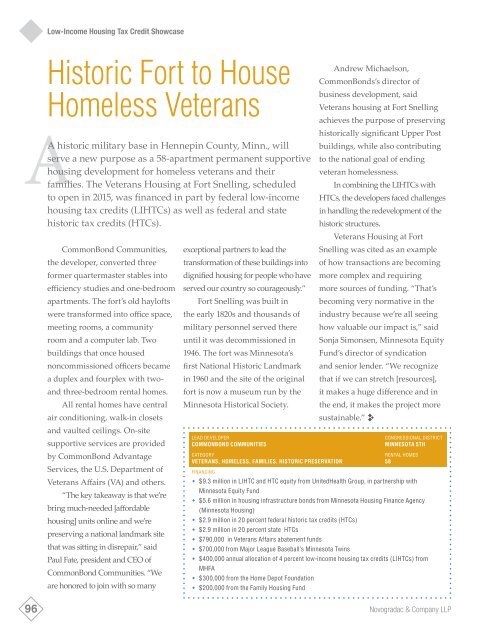LOW-INCOME HOUSING TAX CREDIT SHOWCASE
novogradac_lihtc_showcase
novogradac_lihtc_showcase
Create successful ePaper yourself
Turn your PDF publications into a flip-book with our unique Google optimized e-Paper software.
Low-Income Housing Tax Credit Showcase<br />
Historic Fort to House<br />
Homeless Veterans<br />
A<br />
A historic military base in Hennepin County, Minn., will<br />
serve a new purpose as a 58-apartment permanent supportive<br />
housing development for homeless veterans and their<br />
families. The Veterans Housing at Fort Snelling, scheduled<br />
to open in 2015, was financed in part by federal low-income<br />
housing tax credits (LIHTCs) as well as federal and state<br />
historic tax credits (HTCs).<br />
CommonBond Communities,<br />
the developer, converted three<br />
former quartermaster stables into<br />
efficiency studies and one-bedroom<br />
apartments. The fort’s old haylofts<br />
were transformed into office space,<br />
meeting rooms, a community<br />
room and a computer lab. Two<br />
buildings that once housed<br />
noncommissioned officers became<br />
a duplex and fourplex with twoand<br />
three-bedroom rental homes.<br />
All rental homes have central<br />
air conditioning, walk-in closets<br />
and vaulted ceilings. On-site<br />
supportive services are provided<br />
by CommonBond Advantage<br />
Services, the U.S. Department of<br />
Veterans Affairs (VA) and others.<br />
“The key takeaway is that we’re<br />
bring much-needed [affordable<br />
housing] units online and we’re<br />
preserving a national landmark site<br />
that was sitting in disrepair,” said<br />
Paul Fate, president and CEO of<br />
CommonBond Communities. “We<br />
are honored to join with so many<br />
exceptional partners to lead the<br />
transformation of these buildings into<br />
dignified housing for people who have<br />
served our country so courageously.”<br />
Fort Snelling was built in<br />
the early 1820s and thousands of<br />
military personnel served there<br />
until it was decommissioned in<br />
1946. The fort was Minnesota’s<br />
first National Historic Landmark<br />
in 1960 and the site of the original<br />
fort is now a museum run by the<br />
Minnesota Historical Society.<br />
LEAD DEVELOPER<br />
COMMONBOND COMMUNITIES<br />
CATEGORY<br />
VETERANS, HOMELESS, FAMILIES, HISTORIC PRESERVATION<br />
Andrew Michaelson,<br />
CommonBonds’s director of<br />
business development, said<br />
Veterans housing at Fort Snelling<br />
achieves the purpose of preserving<br />
historically significant Upper Post<br />
buildings, while also contributing<br />
to the national goal of ending<br />
veteran homelessness.<br />
In combining the LIHTCs with<br />
HTCs, the developers faced challenges<br />
in handling the redevelopment of the<br />
historic structures.<br />
Veterans Housing at Fort<br />
Snelling was cited as an example<br />
of how transactions are becoming<br />
more complex and requiring<br />
more sources of funding. “That’s<br />
becoming very normative in the<br />
industry because we’re all seeing<br />
how valuable our impact is,” said<br />
Sonja Simonsen, Minnesota Equity<br />
Fund’s director of syndication<br />
and senior lender. “We recognize<br />
that if we can stretch [resources],<br />
it makes a huge difference and in<br />
the end, it makes the project more<br />
sustainable.” ;<br />
CONGRESSIONAL DISTRICT<br />
MINNESOTA 5TH<br />
RENTAL HOMES<br />
58<br />
FINANCING<br />
• $9.3 million in LIHTC and HTC equity from UnitedHealth Group, in partnership with<br />
Minnesota Equity Fund<br />
• $5.6 million in housing infrastructure bonds from Minnesota Housing Finance Agency<br />
(Minnesota Housing)<br />
• $2.9 million in 20 percent federal historic tax credits (HTCs)<br />
• $2.9 million in 20 percent state HTCs<br />
• $790,000 in Veterans Affairs abatement funds<br />
• $700,000 from Major League Baseball’s Minnesota Twins<br />
• $400,000 annual allocation of 4 percent low-income housing tax credits (LIHTCs) from<br />
MHFA<br />
• $300,000 from the Home Depot Foundation<br />
• $200,000 from the Family Housing Fund<br />
96 Novogradac & Company LLP


